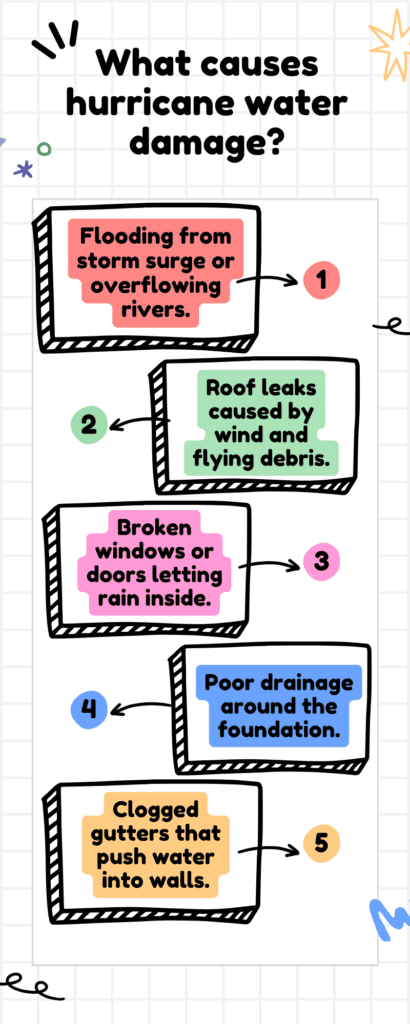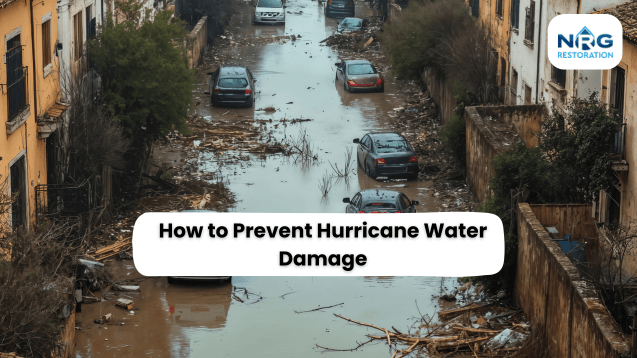When a hurricane is on the horizon, stress levels rise quickly. The fear of flooding, broken windows, and destroyed belongings can feel overwhelming. Homes and businesses stand vulnerable, but preparation makes all the difference. Protecting your property now can save you thousands of dollars and months of emotional distress later.
Hurricanes bring more than strong winds they bring heavy rains that cause serious hurricane water damage. The good news is that you can take proactive steps to reduce the risks before the next big storm strikes. This guide will walk you through simple, effective ways to prepare your property, keep your family safe, and avoid devastating damage.
At NRG Restoration, we have helped countless families and businesses recover after storms. With the right planning, you can be better prepared and feel more in control before the next hurricane arrives.
What causes hurricane water damage?
 Hurricane water damage happens when heavy rains, flooding, or storm surges force water into your home or building. It can ruin walls, floors, furniture, and electrical systems. The real danger is that water damage often continues long after the storm passes, leading to mold, structural issues, and health risks.
Hurricane water damage happens when heavy rains, flooding, or storm surges force water into your home or building. It can ruin walls, floors, furniture, and electrical systems. The real danger is that water damage often continues long after the storm passes, leading to mold, structural issues, and health risks.
Some of the most common causes include:
- Flooding from storm surge or overflowing rivers.
- Roof leaks caused by wind and flying debris.
- Broken windows or doors letting rain inside.
- Poor drainage around the foundation.
- Clogged gutters that push water into walls.
Each of these can turn into a costly problem if not addressed quickly. That’s why preparing before a storm is so important.
How can you protect your home before a hurricane?
Preparation is your strongest defense. Even small steps can significantly lower the risks of hurricane water damage.
Here are some key actions you can take:
- Seal all windows and doors to block water entry.
- Clean gutters and downspouts so water flows away from your house.
- Inspect your roof for cracks, loose shingles, or weak spots.
- Install storm shutters or use plywood to protect windows.
- Elevate appliances and electrical systems if your area is prone to flooding.
- Check that your sump pump works correctly.
By doing these things before the storm, you make your home stronger and safer.
After completing these tasks, it’s important to keep a regular maintenance schedule. Preventive action is not only for hurricane season, it should be part of your yearly routine.
What should you do inside the home?
While preparing the outside of your home is critical, the inside also needs attention. Many people focus only on windows and roofs, but forget that water damage often spreads indoors first.
Here are some steps to protect your interior:
- Move furniture and valuables to higher ground.
- Store important documents in waterproof containers.
- Use sandbags or barriers at entry points where water could enter.
- Unplug electronics to avoid damage or fire hazards.
- Check basement and crawl spaces for possible leaks.
These efforts make a huge difference when the storm hits. Even if water enters, your most valuable items will remain safe.
Can landscaping help prevent hurricane water damage?
Yes, landscaping plays a major role in controlling water flow around your property. Many homeowners overlook this, but a well-prepared yard can redirect rainwater and reduce flooding.
Some effective landscaping tips include:
- Grade your yard so water flows away from your foundation.
- Add plants that absorb excess rainwater.
- Use gravel or stones instead of mulch to avoid floating debris.
- Install a rain garden to collect and filter water.
- Keep drains and outdoor areas clear of debris.
By designing your landscape smartly, you can minimize hurricane water damage before it ever reaches your home.
Why is an emergency plan important?
Storm preparation isn’t just about your house, it’s also about keeping your family safe. A clear emergency plan ensures everyone knows what to do and where to go when the hurricane arrives.
Your emergency plan should include:
- A list of safe evacuation routes.
- A bag with essentials like food, water, and medicines.
- Backup chargers for phones and electronics.
- Contact numbers for family, neighbors, and emergency services.
- A checklist of things to secure before leaving the home.
Once your family has a plan, practice it. Being prepared reduces panic and ensures everyone stays safe.
What should you do after the storm passes?
Even if your home looks safe after a hurricane, hidden problems may exist. Water can seep into walls, ceilings, and flooring without being obvious. That’s when professional help becomes crucial.
After the storm:
- Inspect your roof, windows, and walls for damage.
- Look for water stains or leaks inside the home.
- Remove wet materials to prevent mold.
- Take photos of all damage for insurance.
- Contact restoration experts if needed.
NRG Restoration can help assess, clean, and repair damage. Acting quickly prevents small issues from becoming expensive disasters.
How can NRG Restoration help you recover?
When a storm leaves behind hurricane water damage, the recovery process can feel overwhelming. That’s where professional restoration services make all the difference.
NRG Restoration provides:
- 24/7 emergency response when disasters strike.
- Water extraction and drying services.
- Mold inspection and safe removal.
- Full repair and rebuilding of damaged areas.
- Guidance with insurance claims.
Our team understands how stressful storm recovery can be. With the right support, you don’t have to face the damage alone.
Be prepared before the next big storm
Hurricanes will always be powerful, but hurricane water damage doesn’t have to ruin your property. By sealing windows, cleaning gutters, protecting valuables, and preparing a strong plan, you can protect what matters most.
If the storm does cause damage, acting quickly is key. That’s where NRG Restoration is here to help. From emergency water removal to full home repairs, our team is ready to restore safety and comfort to your property.
Don’t wait for the next big storm start preparing today. And if disaster strikes, trust NRG Restoration to be by your side every step of the way.
